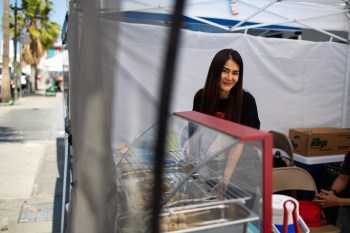A literary approach to business
TEXT OF INTERVIEW
Kai Ryssdal: I think if you took a general survey, most of the “business books” out there would be shelved in the non-fiction section, but former Harvard professor and author Robert Coles took fiction to the Harvard Business School.
For many years, he taught MBA students qualitative, not quantitative, lessons about business by having them read people like Raymond Carver and Flannery O’Connor. He’s put some of those stories together in an anthology called “Minding the Store” and when I asked him why, he told me a story about his own mentor, the poet and physician William Carlos Williams.
Robert Coles: He once turned to me and he said, “You know, a lot going on in this world outside of those college gates. People are trying to make a living and some of them are hiring them and some of them are firing them.” That’s the way he used to talk. And he got me thinking about writers and their connection to society and the way they evoke what goes on in the world and that’s basically what I did at Harvard Business School.
Ryssdal: How did you pick these stories?
Coles: I picked them from my teaching life and reading life. I picked them because in one way or the other, businessmen appear, the business world is approached and in a vernacular sense, these folks are either running stores or getting people to come into their stores. And by the way, there’s a story in this book called “The Housebreaker of Shady Hill.” What a story! It’s a story of upper-class life, but there’s a guy there who’s a little hard up and what does he do? He takes his neighbor’s wallet and takes some dough. And it goes into the inner life of desire, covetousness, yearning…
Ryssdal: And that’s the lesson right? Not that stealing is wrong — although it is — it’s that you have to think about what you do. Could I get you to read part of this for me Dr. Coles, the bit where Cheever has is character in this story, Johnny Hake, talking about how despite all his problems, life really is pretty good?
Coles: OK. He says, “I served four years in the Navy, have four kids now and I live in a [unintelligible]” — note the French — “called Shady Hill. We have a nice house with a garden and a place outside for cooking meat and on summer nights, sitting there with the kids and looking into the front of Christina’s dress as she bends over to salt the stakes or just gazing at the lights in heaven, I am as thrilled as I am thrilled by more hardy and dangerous pursuits and I guess this is what is meant by the pain and sweetness of life.”
Ryssdal: When you taught this course, were you trying to change the way people do business or the way people think about business?
Coles: I’ll tell you what we’re trying to do is change people in the sense to get them to stop, look and listen, to think about life and its meaning. That’s what this book is about. It’s about human connection through storytelling, through moments that’ll stop you and give you pause about what life means, which is what great stories do and which I think business people all the time are trying to do, because you know, in their own way, they’re offering themselves and what they have to offer to other people and trying to bring them in, sort of, to their living room. “Come here. Be with me. Take what I have to offer. Join this world. For a few seconds, we are a world. We’re together” and as I repeat from [unintelligible] “We’ve connected.”
Ryssdal: Robert Coles is an educator, he’s a child psychiatrist, he is a writer and he is with Albert LaFarge the editor of “Minding the Store: Great Literature About Business,” from Tolstoy to now. Dr. Coles, thanks so much for your time.
Coles: Thank you for having me here.
There’s a lot happening in the world. Through it all, Marketplace is here for you.
You rely on Marketplace to break down the world’s events and tell you how it affects you in a fact-based, approachable way. We rely on your financial support to keep making that possible.
Your donation today powers the independent journalism that you rely on. For just $5/month, you can help sustain Marketplace so we can keep reporting on the things that matter to you.


















